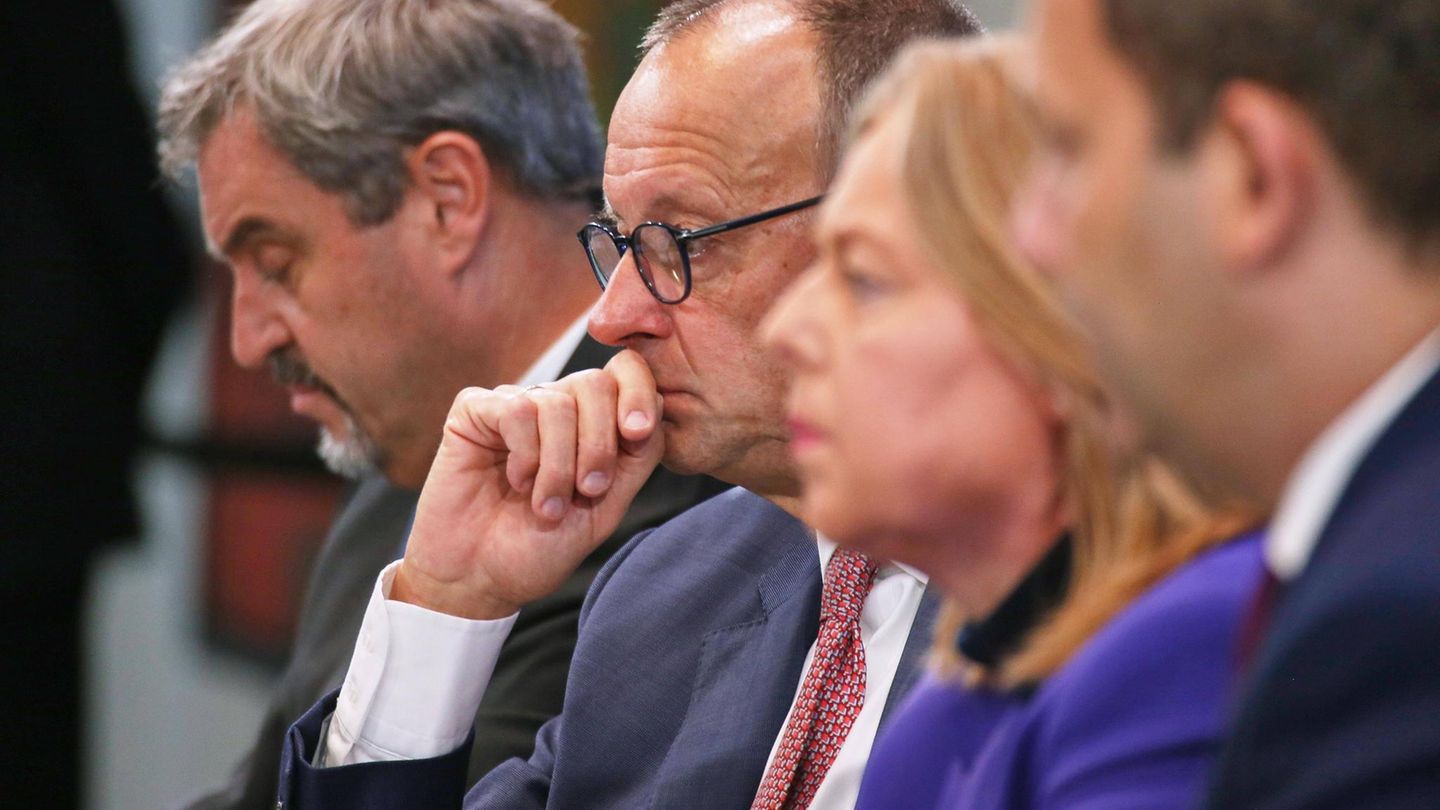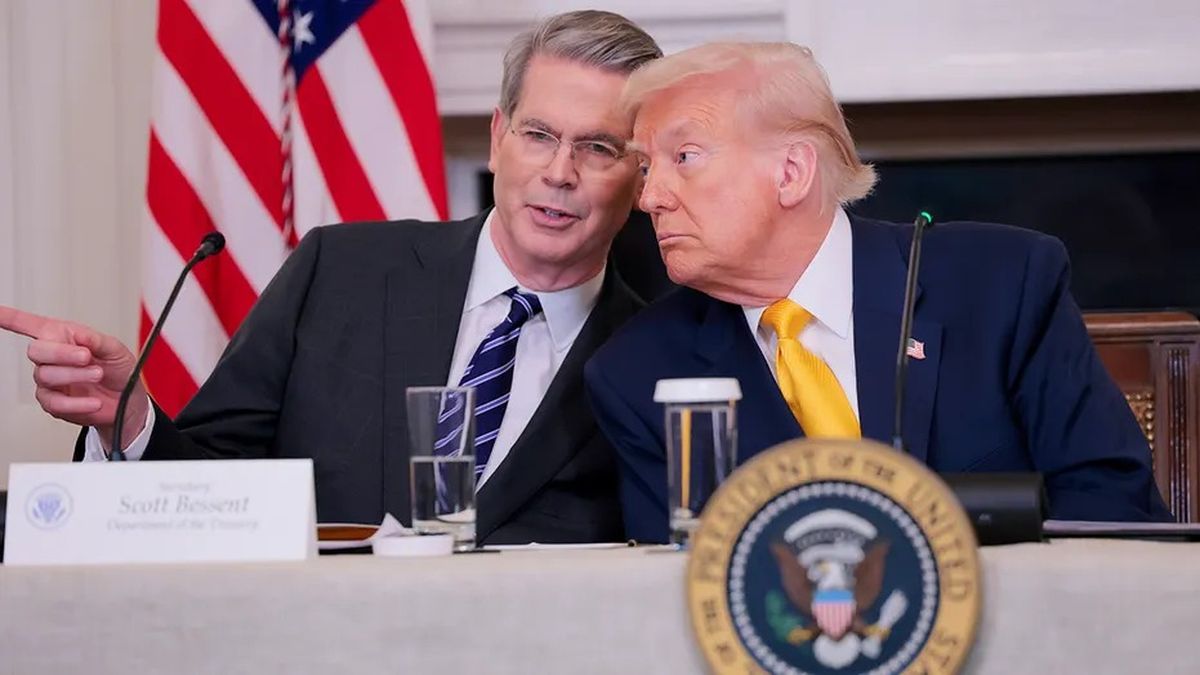Merz government
Efforts have been made – five lessons from the coalition committee
Copy the current link
Add to watchlist
Friedrich Merz and friends: The leaders of the Union and SPD fought for nine hours in the coalition committee. The most important result: Citizens’ money is being reformed. Is the coalition in a better position now?
Citizens’ money, active pensions, construction projects – these are the results of the coalition committee. But once again it has been shown that black-red progress is a snail.
1. Governing is so damn hard
The coalition members sat together for around nine hours on Thursday night. The coalition committee meeting is said to have only ended at around 2:30 a.m. The next morning, Friedrich Merz, Bärbel Bas, Lars Klingbeil and Markus Söder only presented three topics on which there was agreement. Topics that have been discussed for weeks, sometimes for months. This is not exactly a result that exudes a sense of optimism. Governing is quite difficult.
Even in Friedrich Merz’s black-red coalition, the regular meeting of party and faction leaders is not a routine committee that checks once a month to see whether everything is going well and makes a few corrections if necessary. Instead, the party leaders discuss hard and go deep into the details. Finance Minister Lars Klingbeil reported that the lists of planned and approved transport projects had been gone through again in order to determine the real financial requirements. And there was also a long debate about the details of citizens’ money, even though the Chancellor and Labor Minister Bärbel Bas had already sat together for a long time in the days before and on Wednesday lunchtime.
2. The mood was really good, honestly
The Chancellor couldn’t say it often enough. It started with: “We decided on all of this in a really good atmosphere.” He then thanked him for “the really, really good cooperation.” Then: “Overall, it was a really, really good working atmosphere.” And then: “Overall, a really good coalition committee in a good working atmosphere.” Friedrich Merz’s efforts to ensure that the hours in the Chancellery did not appear to be a crisis meeting of a divided government were intensive. The fact that he always underlined his appreciation with a “really” revealed that the Chancellor knew the skepticism among journalists that had to be overcome.
In the hours before the meeting, some coalition members had spread the word that it was almost about the survival of the government, which may have been a bit exaggerated. The fact, however, was that at the Union parliamentary group meeting on Tuesday there was massive dissatisfaction with the coalition’s progress, which also put the Chancellor under pressure.
3. The brake on citizen money is gone
“There will be really (!) good basic security,” promised Friedrich Merz. “And the issue of citizens’ money will be a thing of the past.” This should mark the end of a debate that at times dominated, even paralyzed, the beginning of this government. In the dispute over citizens’ money, it was not just the coalition members’ different welfare state concepts that seemed to clash. The gradual shrinking of the savings potential dreamed of by Friedrich Merz and the Union over the past few months also reflected the gradual arrival of the CDU and CSU in government reality. Nevertheless, for the Union, the new toughness is politically the most important result in order to counteract the impression it has created that the state is primarily financing the idleness of idlers with the money of the working population.
It is a remarkable step for the SPD that in the end it agreed to cancel all benefits after a multi-stage process of stricter sanctions in the most extreme case. The results of the local elections in North Rhine-Westphalia are unlikely to have been without impact. Whether the regulation complies with the Basic Law will sooner or later become clear before the Constitutional Court.
4. Minister Reiche, please pay!
The Chancellor promised: “Everything that is ready for construction will be built.” The weeks-long dispute over transport investments revealed that some holes in politics simply become smaller if you stare into them long enough. The transport minister recently complained about the lack of around 15 billion euros for the construction of already planned and approved roads and railways. According to the coalition committee, there was only a shortfall of three billion euros. How does it work? It’s simple: “We took another look at the list of projects ready for construction,” reported the Chancellor. They “re-checked all the lists very carefully.” Whoosh, there was a lot less money missing.
The clear winner from this discussion was Finance Minister Lars Klingbeil, who had always criticized the deficit as being far too high. The three billion euros will now be reallocated in the 500 billion euro special fund for investments. The victim is Economics Minister Katherina Reiche (CDU), as Klingbeil explained in passing: three billion that she had previously earmarked for investments in microelectronics will be “shifted over” to the road sector, as the finance minister put it.
5. Combustion engine off: emergency braking should be progress
In Chancellor life, after the meeting is before the meeting. Representatives from the auto industry were already waiting for Friedrich Merz at midday. The Chancellor, Finance Minister Klingbeil and also Markus Söder, this time in his role as Prime Minister of Bavaria, the car region, want to talk to them about ways out of the crisis in Germany’s key industry. They all agreed, everyone emphasized in advance, that the main thing was to preserve jobs at car manufacturers and, above all, at suppliers. The loss of thousands of jobs at Bosch, Conti and ZF has also sent shockwaves through the coalition. The most important point of contention in the government: the end of combustion engines in 2035. Söder definitely wants that gone. “To believe that everything will be electric in 2035 is illusory,” he said in the press conference after the coalition committee. Merz agrees with him, just not quite as loudly. Other prime ministers such as Lower Saxony’s Olaf Lies advocate flexible solutions; the SPD has so far stuck most strictly to 2035. But even there the position is loosening. The issue will most likely be on the agenda of the next coalition committee. Because it will definitely come.
Source: Stern
I have been working in the news industry for over 6 years, first as a reporter and now as an editor. I have covered politics extensively, and my work has appeared in major newspapers and online news outlets around the world. In addition to my writing, I also contribute regularly to 24 Hours World.




